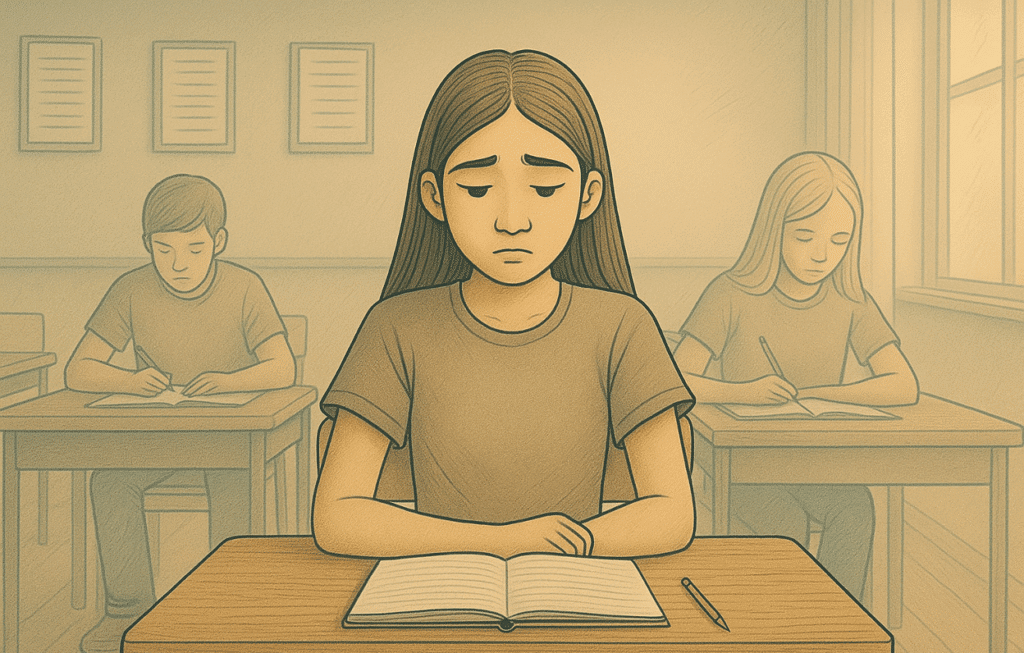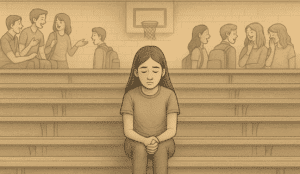Key Takeaways
- Depression creates hidden barriers to learning, lowering motivation, focus, and memory, and can start a cycle where poor grades worsen depressive symptoms.
- Depression impairs brain function, affecting attention, memory, and processing, so even high-achieving students can suddenly struggle academically.
- Fatigue, sleep issues, and “brain fog” make studying, problem-solving, and learning under pressure much harder, reducing performance despite effort.
- Social withdrawal from peers, study groups, and teachers removes key support, deepening academic challenges and disengagement.
- Mission Prep offers teen-focused therapy, integrated academic support, and family involvement to help adolescents 12–17 regain confidence, succeed in school, and build lasting resilience.
The Hidden Link Between Depression and Academic Performance
Depression creates hidden barriers to learning that often go unnoticed by teachers and students. Unlike visible illnesses, its impact on academics develops gradually, sometimes only becoming clear when grades drop. Academic pressure can worsen depression, while depression makes schoolwork harder, creating a cycle of poor performance and increasing feelings of hopelessness.
In addition to grades, depression can also reduce motivation, concentration, and memory, further hindering a student’s ability to succeed. Breaking this cycle requires understanding how depression directly affects learning, seeking timely support, and addressing both mental health and academic challenges together.
| Mission Prep Healthcare: Adolescent Mental Health Care Mission Prep Healthcare specializes in mental health treatment for teens aged 12-17, offering residential and outpatient programs for anxiety, depression, trauma, and mood disorders. Our therapies include CBT, DBT, EMDR, and TMS, tailored to each adolescent’s needs. With a structured, supportive environment, we integrate academic support and family involvement to promote lasting recovery. Our goal is to help teens build resilience and regain confidence in their future. Start your recovery journey with Mission Prep Healthcare today! |
How Depression Directly Affects Learning Abilities
Depression doesn’t just cause sadness—it fundamentally alters brain function, affecting learning, memory, and information processing. Even previously high-achieving students can experience sudden academic struggles, independent of intelligence or potential. Recognising these effects early is crucial for timely support.
Concentration and Memory Problems
Students with depression often struggle to focus during lectures or study sessions, with their minds frequently wandering. Memory formation and recall are also impaired, making it difficult to retain or retrieve information during exams. This mismatch between effort and results can heighten frustration, anxiety, and hopelessness.
Loss of Motivation and Interest in Studies
Depression reduces the natural rewards of learning, creating a profound motivational deficit. Subjects that once sparked curiosity may feel meaningless, making it hard to start or maintain academic work. This lack of engagement can also affect participation in class and completion of assignments.
Energy Depletion and Sleep Disruption
Fatigue and disrupted sleep make even routine academic tasks feel overwhelming. Many students feel physically exhausted despite rest, while insomnia or hypersomnia further drains cognitive resources, impairing focus, memory, and overall learning capacity.
Cognitive Processing Slowdown
“Brain fog” and slower cognitive processing make real-time learning, problem-solving, and applying knowledge under pressure especially difficult. Negative thoughts and emotional distress consume mental bandwidth, so students often underperform despite their abilities.
Social Withdrawal in Educational Settings
Depressed students may withdraw from study groups, discussions, or teacher interactions, missing key learning and support opportunities. Isolation reduces collaborative learning, peer feedback, and motivation, creating additional academic disadvantages beyond individual cognitive challenges.

Social withdrawal in students often precedes noticeable drops in grades.
Scientific Evidence: The Depression–Grades Connection
Depression is strongly linked to academic underperformance across all educational levels. Research using U.S. middle and high school data showed that students with depression, especially severe or persistent symptoms, experienced GPA reductions of 0.06 to 0.84 points, demonstrating the measurable impact of depression on academic outcomes.
Among university students, one study found that a third of participants screened for possible depression had lower GPAs and reported reduced satisfaction with their studies, emphasizing the negative influence of depressive symptoms on academic performance.
A longitudinal study of first-year college roommates revealed that depressive symptoms lowered students’ own GPAs and course completion rates and affected roommates in close relationships. This highlights how depression can indirectly influence academic outcomes within social environments.
These studies collectively confirm that teenage depression significantly interferes with learning and performance, making timely mental health support essential for academic success.
Long-term Effects on Educational Achievement
Depression increases dropout risks and can limit future educational and career opportunities. Even students who stay enrolled may experience cumulative underperformance, reducing access to competitive programs, scholarships, and career pathways. Early intervention is crucial to mitigate both mental health and long-term educational consequences.
The Dangerous Cycle: Bad Grades Worsening Depression
Academic difficulties can worsen depression, creating a self-reinforcing cycle. Poor grades trigger feelings of worthlessness and hopelessness, which in turn impair academic performance. Over time, this downward spiral can lead to disengagement, course failures, and educational discontinuation, further reinforcing negative self-perceptions.
Perfectionism and Academic Pressure
Students with perfectionistic tendencies are especially vulnerable. Anything less than exceptional achievement can feel like failure, amplifying depression and academic anxiety. Normal academic challenges become overwhelming threats to self-worth, intensifying the cycle.
Parental and Teacher Responses That Help or Hurt
Adult responses play a key role. Pressure, punishment, or criticism can worsen depression, while support that separates self-worth from performance, acknowledges mental health challenges, and maintains flexible expectations fosters recovery and academic reengagement.
5 Warning Signs Your Grades Are Suffering Due to Depression
Recognizing when depression underlies academic struggles is crucial for early intervention, preventing long-term consequences like course failures or program discontinuation.
1. Sudden Drop in Previously Strong Subjects
A rapid decline in subjects where a student once excelled, especially across multiple areas, may indicate depression rather than external factors. Broad impacts are more typical than isolated subject difficulties.
2. Incomplete Assignments Despite Studying
Students may spend hours studying yet produce little completed work. This reflects depression’s effects on concentration, processing, and executive function rather than laziness, with unfinished assignments or unusual errors as common signs.
3. Test Anxiety and Panic During Assessments
Depression can intensify performance anxiety, leading to mind blanks, panic, or freezing during tests despite adequate preparation. Memory retrieval under pressure is often impaired.
4. Increased Absences or Tardiness
Fatigue, sleep disruption, and low motivation may cause missed classes or chronic lateness. Avoidance of participation-heavy classes can indicate social anxiety linked to depression rather than simple disinterest.
5. Withdrawal From Study Groups and Academic Activities
Students may disengage from collaborative learning, clubs, or discussions, losing support and learning opportunities. Early social withdrawal often precedes noticeable grade declines, signaling depression’s impact on engagement and self-worth.
Effective Strategies to Improve Grades While Managing Depression
Addressing depression-related academic struggles requires approaches that support both mental health and learning simultaneously. Coordinating these efforts is key to recovery and academic success.

Early intervention can prevent academic setbacks linked to persistent depressive symptoms.
Academic Accommodations You Can Request
Institutions offer accommodations such as extended deadlines, reduced course loads, alternative testing arrangements, and modified participation requirements. These adjustments aren’t shortcuts—they help students maintain progress while recovering. To access them, connect with disability/accessibility services with documentation from a mental health professional.
Study Techniques That Work With Depression Symptoms
Depression often affects concentration and memory, so traditional study methods may be ineffective. Strategies include:
- Spaced repetition and micro-study sessions (5–15 minutes)
- Multi-sensory learning to engage different cognitive pathways
- Structured schedules are independent of motivation
- External organisation tools (apps, planners)
- Peer accountability partnerships to maintain engagement
Communication Tips for Talking to Teachers
Discussing depression’s impact in practical terms helps instructors provide support. Focus on academic effects rather than detailed health disclosures, and pair problems with proposed solutions, like recording lectures or alternative assignment formats.
Building a Support Network at School
A strong academic support network, including advisors, study partners, tutoring services, and coaching resources, provides practical assistance and accountability, helping students stay engaged even during depressive episodes.
Treatment Approaches That Boost Academic Success
Addressing depression’s impact on academics requires treatments that focus on both cognitive and functional recovery. The goal isn’t just symptom reduction but restoring attention, motivation, memory, and problem-solving skills essential for learning. Functional recovery ensures improvements translate into better classroom performance and academic engagement.
Therapy Options With Proven Results for Students
Cognitive Behavioral Therapy (CBT) has strong evidence for improving academic functioning, helping students challenge negative thought patterns, manage stress, and build practical study strategies.
Other therapies, such as Interpersonal Therapy (IPT) and Mindfulness-Based Cognitive Therapy, can enhance emotional regulation, social functioning, and focus, further supporting learning. Combining therapy with structured academic coaching or skills-based interventions often produces the fastest improvements in grades and classroom engagement.
Medication Considerations for Academic Performance
While some students may benefit from antidepressants, careful attention to side effects like drowsiness or reduced concentration is important. Coordinating with healthcare providers and timing adjustments around academic schedules can reduce disruption. Medication is most effective when combined with therapy and lifestyle strategies.
Lifestyle Changes That Improve Both Mood and Grades
Regular exercise, consistent sleep, and balanced nutrition support both cognitive function and mood. Small, consistent habits, like short study sessions, mindfulness breaks, and physical activity, can help maintain energy, focus, and resilience while managing depression.
Mission Prep: Supporting Teens’ Mental Health and Academic Success
Mission Prep is dedicated exclusively to adolescents aged 12–17, offering residential, outpatient, and virtual programs for teens struggling with depression, anxiety, trauma, mood disorders, and technology dependence. Our licensed, home-like environments provide structure, emotional safety, and a sense of belonging, creating the ideal setting for both healing and learning.

Evidence-based therapies like CBT and DBT improve both mental health and school performance.
Teens at Mission Prep benefit from evidence-based, age-appropriate therapies designed to keep them engaged and supported:
- Cognitive Behavioral Therapy (CBT), Dialectical Behavior Therapy (DBT), EMDR, and Transcranial Magnetic Stimulation (TMS) to address emotional, cognitive, and behavioral challenges
- Integrated academic support to maintain progress and confidence in school
- Small group homes with semi-private rooms and shared meals to foster community and stability
Family involvement is a central part of treatment, ensuring progress extends beyond the program:
- Weekly family therapy sessions to strengthen relationships and communication
- Regular updates and structured transition planning for smoother reintegration at home and school
- Supportive guidance for parents to reinforce coping skills and resilience
With locations in California and Virginia, Mission Prep combines personalized therapy, academic continuity, and family-centered care to help teens regain confidence, overcome setbacks, and thrive both emotionally and academically, preparing them for long-term success.
Frequently Asked Questions (FAQs)
Can depression cause someone to fail classes even if they’re smart?
Yes. Depression disrupts concentration, memory, motivation, and information processing. Even highly intelligent students can underperform or fail because these cognitive impairments interfere with learning and academic tasks. Intelligence alone cannot overcome the functional challenges caused by depressive episodes.
How quickly can grades improve after depression treatment begins?
Academic improvement often lags behind mood recovery by weeks or months. Cognitive symptoms like poor focus and memory resolve gradually. Most students see progress within 4–8 weeks, with full academic recovery potentially taking a semester, especially when paired with proper accommodations.
Should students take a break from school when dealing with depression?
It depends on severity and support. Severe depression may require temporary leave for intensive treatment. Mild to moderate cases often benefit from continued engagement with reduced workloads and accommodations, maintaining routine and purpose while supporting recovery.
Can teachers tell the difference between laziness and depression?
Not easily. Depression-related academic struggles can look like laziness, including missed assignments or low participation. Without training, teachers may misinterpret these behaviors, highlighting the need for awareness and communication about mental health in educational settings.
Are there programs specifically designed for teens rather than adults?
Absolutely. Mission Prep exclusively serves adolescents aged 12–17, providing developmentally appropriate therapies, structured routines, and peer environments that address the unique challenges of this age group.


















